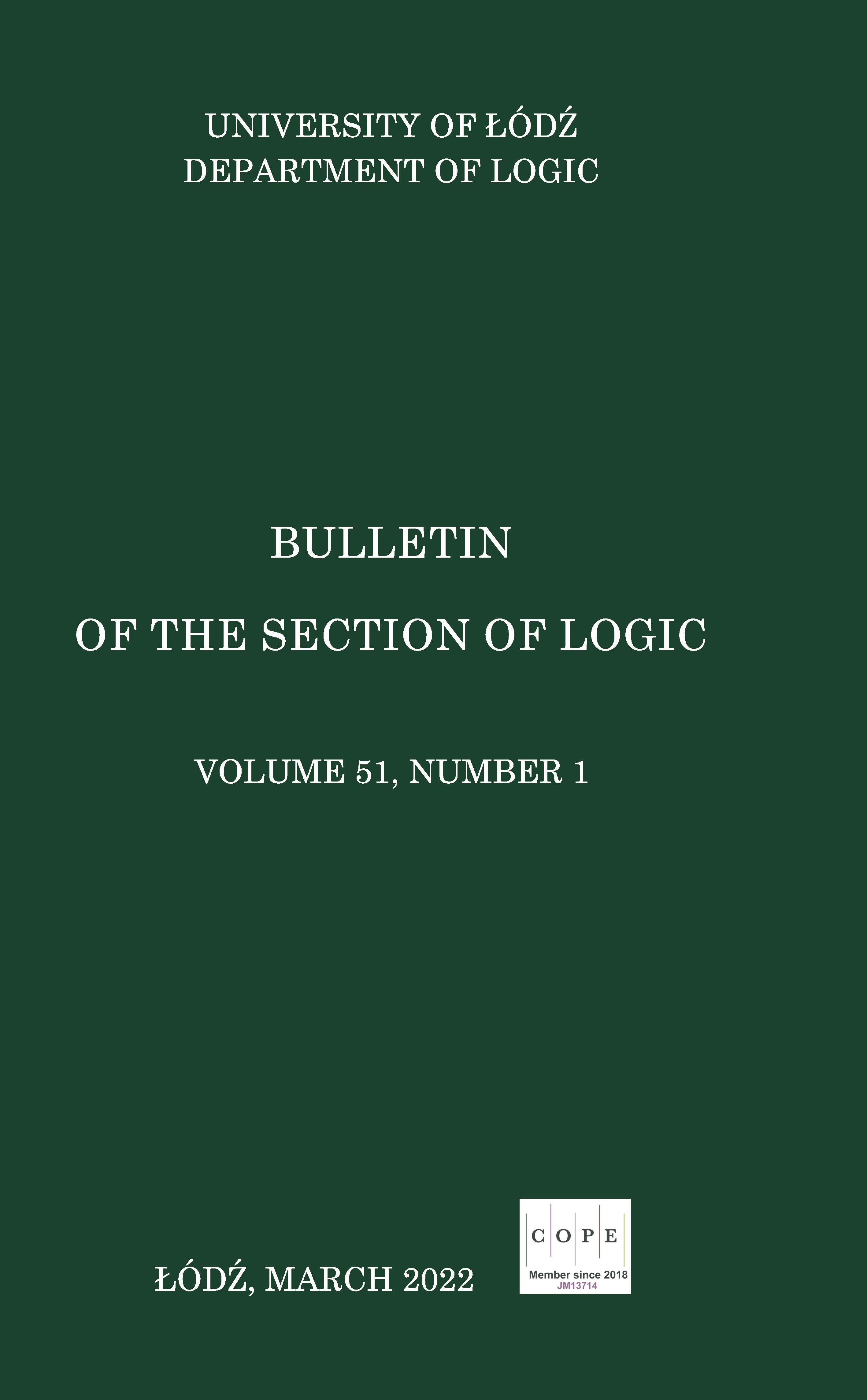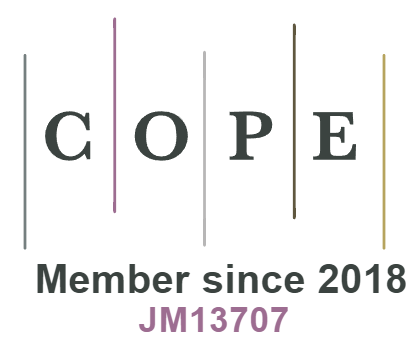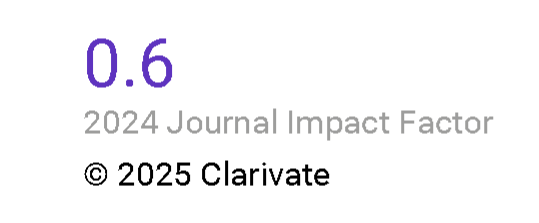Weakly Free Multialgebras
DOI:
https://doi.org/10.18778/0138-0680.2021.19Keywords:
Algebras of terms, universal mapping property, absolutely free algebras, multialgebras, hyperalgebras, non-deterministic algebras, category of multialgebras, non-deterministic semanticsAbstract
In abstract algebraic logic, many systems, such as those paraconsistent logics taking inspiration from da Costa's hierarchy, are not algebraizable by even the broadest standard methodologies, as that of Blok and Pigozzi. However, these logics can be semantically characterized by means of non-deterministic algebraic structures such as Nmatrices, RNmatrices and swap structures. These structures are based on multialgebras, which generalize algebras by allowing the result of an operation to assume a non-empty set of values. This leads to an interest in exploring the foundations of multialgebras applied to the study of logic systems.
It is well known from universal algebra that, for every signature \(\Sigma\), there exist algebras over \(\Sigma\) which are absolutely free, meaning that they do not satisfy any identities or, alternatively, satisfy the universal mapping property for the class of \(\Sigma\)-algebras. Furthermore, once we fix a cardinality of the generating set, they are, up to isomorphisms, unique, and equal to algebras of terms (or propositional formulas, in the context of logic). Equivalently, the forgetful functor, from the category of \(\Sigma\)-algebras to Set, has a left adjoint. This result does not extend to multialgebras. Not only multialgebras satisfying the universal mapping property do not exist, but the forgetful functor \(\mathcal{U}\), from the category of \(\Sigma\)-multialgebras to Set, does not have a left adjoint.
In this paper we generalize, in a natural way, algebras of terms to multialgebras of terms, whose family of submultialgebras enjoys many properties of the former. One example is that, to every pair consisting of a function, from a submultialgebra of a multialgebra of terms to another multialgebra, and a collection of choices (which selects how a homomorphism approaches indeterminacies), there corresponds a unique homomorphism, what resembles the universal mapping property. Another example is that the multialgebras of terms are generated by a set that may be viewed as a strong basis, which we call the ground of the multialgebra. Submultialgebras of multialgebras of terms are what we call weakly free multialgebras. Finally, with these definitions at hand, we offer a simple proof that multialgebras with the universal mapping property for the class of all multialgebras do not exist and that \(\mathcal{U}\) does not have a left adjoint.
References
A. Avron, I. Lev, Canonical Propositional Gentzen-Type Systems, [in:] R. Goré, A. Leitsch, T. Nipkow (eds.), Automated Reasoning, vol. 2083, Springer (2001), pp. 529–544, DOI: https://doi.org/10.1007/3-540-45744-5_45
Google Scholar
DOI: https://doi.org/10.1007/3-540-45744-5_45
S. Burris, H. P. Sankappanavar, A Course in Universal Algebra, vol. 78 of Graduate Texts in Mathematics, Springer New York (1981).
Google Scholar
DOI: https://doi.org/10.1007/978-1-4613-8130-3
W. A. Carnielli, M. E. Coniglio, Paraconsistent logic: Consistency, Contradiction and Negation, vol. 40 of Logic, Epistemology, and the Unity of Science, Springer (2016), DOI: https://doi.org/10.1007/978-3-319-33205-5
Google Scholar
DOI: https://doi.org/10.1007/978-3-319-33205-5
W. A. Carnielli, J. Marcos, A taxonomy of C-systems, [in:] W. A. Carnielli, M. E. Coniglio, I. M. L. D’Ottaviano (eds.), Paraconsistency: The Logical Way to the Inconsistent. Proceedings of the 2nd World Congress on Paraconsistency, vol. 228 of Lecture Notes in Pure and Applied Mathematics, Marcel Dekker, New York (2002), pp. 1–94, DOI: https://doi.org/10.1201/9780203910139
Google Scholar
DOI: https://doi.org/10.1201/9780203910139.pt1
M. E. Coniglio, A. Figallo-Orellano, A. C. Golzio, Non-deterministic algebraization of logics by swap structures, Logic Journal of the Interest Group in Pure and Applied Logics, vol. 28(5) (2020), pp. 1021–1059, DOI: https://doi.org/10.1093/jigpal/jzy072
Google Scholar
DOI: https://doi.org/10.1093/jigpal/jzy072
M. E. Coniglio, A. Sernadas, C. Sernadas, J. Rasga, A graph-theoretic account of logics, Journal of Logic and Computation, vol. 19(6) (2009), pp. 1281–1320, DOI: https://doi.org/10.1093/logcom/exp023
Google Scholar
DOI: https://doi.org/10.1093/logcom/exp023
M. E. Coniglio, G. V. Toledo, A simple decision procedure for da Costa’s ({C}_n) logics by Restricted Nmatrix semantics (2020), arXiv:2011.10151 [math.LO].
Google Scholar
DOI: https://doi.org/10.1007/s11225-021-09972-z
Ǵ. Čupona, R. Madarász, Free Poly-Algebras, Mathematics Series of the University of Novi Sad, vol. 23(2) (1993), pp. 245–261.
Google Scholar
N. C. A. da Costa, Sistemas formais inconsistentes (Inconsistent formal systems, in Portuguese), Habilitation thesis, Universidade Federal do Paraná, Curitiba, Brazil (1963), republished by Editora da Universidade Federal do Paraná, Curitiba, Brazil, 1993.
Google Scholar
F. Marty, Sur une généralisation de la notion de groupe, [in:] Comptes rendus du huitième congrès des mathématiciens scandinaves, Stockholm, Sweden (1934), pp. 45–49.
Google Scholar
Downloads
Published
How to Cite
Issue
Section
License

This work is licensed under a Creative Commons Attribution-NonCommercial-NoDerivatives 4.0 International License.















